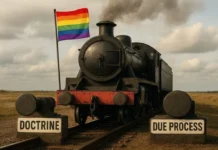Bostock v. Clayton County is the first U.S. Supreme Court decision that directly addresses the issue of transgender rights. At issue is the meaning of the word “sex” in the Civil Rights Act of 1964 and, specifically, whether the word “sex” encompasses sexual orientation and gender expression/self-identity. Policy questions aside, the Supreme Court has once again proven an unsettling enthusiasm for enacting laws without Congressional approval or the president’s signature. Led by Justice Neil Gorsuch, the majority of the Court ignored canons of statutory interpretation and decades of legislative history in order to read a meaning into the law that was never intended. This decision is celebrated by activists as a victory that they have continuously been denied by the deliberative and democratic legislative process, but it represents a significant blow to authentic diversity, the separation of powers, and the rule of law.
What was at stake?
The plaintiffs in these cases include a transgender funeral home worker, a homosexual skydiving instructor, and a homosexual government employee. All three lost employment due to their status as homosexual or transgender and sued to recover damages, claiming they were fired because of their “sex.” The Court decided to combine all three cases, and this week the nation learned that lurking beneath the plain meaning of the text of the 1964 Civil Rights Act is an expansive definition heretofore undiscovered.
Acts of jurisprudential sleight-of-hand like this one are far too common. It is likened to a “pirate ship” sailing under a “textualist flag” in Justice Samuel Alito’s masterful and devastating dissent.
Most significant is the case of Harris Funeral Homes, which fired a transgender employee who was hired as a man and who initially wore men’s clothing but later decided to dress and present as a woman. Gorsuch found that in this case the employer’s decision was bound up with the employee’s sex. A man would never be fired for dressing like a man, so a woman could never be fired for dressing like a woman. Any disparity would be impermissible under the law. Gorsuch has assumed, however, a subjective answer to the question, “What is a woman?” Up until very recently, this question has had an obvious and objective answer that would almost certainly be the type of fact ripe to be considered by way of judicial notice, a legal procedure that admits “notorious or well known” facts into evidence. The answer is now a topic for strenuous debate.
Obfuscating true diversity
This decision contains significant implications for the nation’s democratic self-determination and Americans’ unalienable rights. The Court has pledged that there was never a consideration of religious freedom in this case, so neither the Religious Freedom Restoration Act (RFRA) nor the exclusive rights of churches to consecrate their own clergy as recognized by the Court in Hosanna-Tabor Evangelical Lutheran Church & School v. EEOC is in peril. It is hard, however, to place much stock in this assurance given the ease with which six justices undermined the constitutional order and effectively rewrote the Civil Rights Act of 1964.
What remains unclear, however, is how women (as society has traditionally understood the category) will ever enjoy protection against discrimination under this new scheme. A person who is male in all ways other than self-identification is free to compete in women’s sports, seek admission to a battered women’s shelter, or gain access to locker rooms and restrooms that are segregated by biological sex. How can anyone demand to hear women’s voices on corporate boards or see them represented even on the Supreme Court if the only prerequisite to being a woman is a self-declaration completely disconnected from any objective standard? Authentic diversity, which is already difficult to realize, has just become more elusive.
The dangers of a “living constitution”
The most alarming part of Bostock, however, is not those implications, as serious as they are. The most dangerous aspect of this decision is the precedent for the blatant rewriting of the law. The Constitution vests the legislative power of the United States in the Congress. Legislatures are elected from communities and, more than any other part of the government, they are most responsive to the popular will. Of the available options, it is in the legislature that policy decisions are most fruitful and most authoritative, even if the process itself is flawed and corrupted by special interests and often self-serving politicians. And, as Justice Alito points out in his dissent, there is a long history of Congress indicating time and again that “sex” in the Civil Rights Act of 1964 sought to protect people from discrimination on the basis of their biological sex. The relative wisdom of the various answers to the policy question is irrelevant: The law simply does not support the decision in Bostock, especially in light of overwhelming evidence that the rightful promulgators of law have been aware that “sex” does not and has never encompassed sexual orientation or gender self-identity. The Gorsuch majority opinion has ignored the clear separation of powers and claimed even more ground for the courts to shape public life without regard to the democratic process.
The U.S. Constitution is the oldest written constitution in the world in large part because it has given the people democratic control over the divided and balanced powers of government. While the constitutional structures of the system have steadily eroded, the system has cultivated a stable society with predictable laws and legal processes. This is the very heart of rule of law, which is dependent upon consistency and clarity. Members of a society must have assurances that the law that they read today will not change in ways that alter their standing before the law, their contracts, the claims to property, and any other right protected or recognized by law. It is decisions like this one that undermine the rule of law by subverting the system that has given rise to it.
The consequences of this decision
Reckless jurisprudence like that on display in Bostock is often defended, because some argue that it is not the role of the judge to look ahead to the social or legal chaos that may ensue because of a particular ruling. The duty of a court is a duty to the law. It is not a duty to activism nor to innovation. In fact, the judicial branch should be the least innovative branch of government and a safe harbor for consistency and restraint. Six justices of the United States Supreme Court have betrayed that duty this week and, in the process, dealt a significant blow to a system that has—despite its imperfections—provided the space for economic, cultural, and even moral growth. It remains to be seen just how significant the damage will be.




Gorsuch said that a man who claimed to be a woman and who dressed as a woman was in fact a man. This was a major win in that regard.
No, it appears to be a major loss insofar as the biological determination of sex was deemed to be irrelevant, whereas the law made a merry ass of itself as usual.
Did a majority of the Court support him on that?
If so, it is indeed a major win. Some of the stories coming out of the US about college change-rooms are alarming.
Irrelevant?! It’s the entire foundation of the decision!
The funeral home discriminated against the man wearing a dress because he is a man. That’s the finding of the court.
How was it begging the question?
Thank you for that extended answer. I’m still not sure that I get the bit about begging the question. I follow your impeccable logic. Maybe my brain hasn’t woken up yet. For an American perspective from the past I’ll have to re-read Jonathan Edwards’ lengthy exposition about what constitutes begging the question!
Not to mention things like: Men who claim they are women asserting free right to be in women’s change rooms.
The Supreme Court showed its utter contempt for democratic institutions when it forced recognition of same-sex marriage on the American people instead of allowing legislatures to decide the matter. For all America’s greatness, I think our High Court in Australia is far superior to the US Supreme Court.